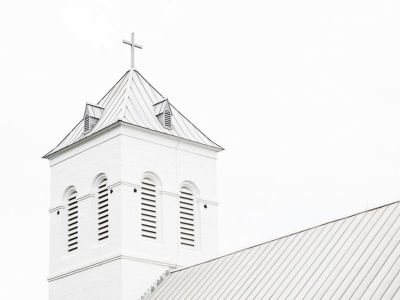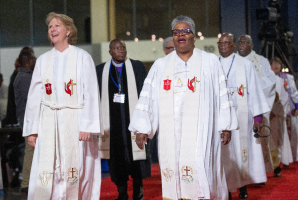A durable Baptist public theology for confusing times

Today American Christians are vigorously debating the best ways to live out their faith in the rapidly changing, often hostile context in which Christian values are often on the defensive. This is not at all new. Believers from the beginning of the Republic, and long before, have wrestled with their stewardship of their citizenship.[i]
It was our Baptist forefathers, after all, who dissented against the Anglican state Church of England. It was Baptist pastors, such as Roger Williams who opposed the established state churches in the colonies. It was Baptist leaders like Isaac Backus and John Leland who worked with Thomas Jefferson and James Madison to create the Bill of Rights and establish religious liberty in America’s fledgling democracy.
In the decade prior to the American Revolution, over 500 Baptist preachers were imprisoned for “disturbing the peace,” which is not the worst definition for Gospel preaching. What the colonial authorities meant, of course, was they were preaching without a license or permit from the state. Thomas Jefferson is reported to have said that when he died, he would be content to have three things on his memorial: 1. his role in bringing religious liberty to Virginia; 2. his authorship of the Declaration of Independence; and 3. his founding of the University of Virginia.
Isaac Backus’ famous words in 1773 have helpfully guided Baptist beliefs and convictions in the 250 years since:
“Religious matters are to be separated from the jurisdiction of the state, not because they are beneath the interests of the state but, quite to the contrary, because they are too high and holy and thus are beyond the competence of the state.”
Baptists, having been persecuted both in England and in Colonial America, encouraged active Christian engagement in the public square, while at the same time resisting an official state-supported church.
They also understood fully the excesses of both Magesterial Protestantism and the Church of Rome, social arrangements which proved disastrous for all concerned, including the Gospel.
This deep conviction is echoed in the earliest Baptist confessions, including the 1689 Second London Baptist Confession:
“God alone is Lord of the conscience, and hath left it free from the doctrines and commandments of men which are in any thing contrary to his word, or not contained in it. So that to believe such doctrines, or obey such commands out of conscience, is to betray true liberty of conscience; and the requiring of an implicit faith, an absolute and blind obedience, is to destroy liberty of conscience and reason also.” (James 4:12; Romans 14:4; Acts 4:19, 29; 1 Corinthians 7:23; Matthew 15:9; Colossians 2:20, 22, 23; 1 Corinthians 3:5; 2 Corinthians 1:24)
This firmly rooted belief in religious liberty has loomed large in Southern Baptist life as indicated in the Baptist Faith & Message, whose language has remained consistent on this issue.
“God alone is Lord of the conscience, and He has left it free from the doctrines and commandments of men which are contrary to His Word or not contained in it. Church and state should be separate. The state owes to every church protection and full freedom in the pursuit of its spiritual ends. In providing for such freedom no ecclesiastical group or denomination should be favored by the state more than others. Civil government being ordained of God, it is the duty of Christians to render loyal obedience thereto in all things not contrary to the revealed will of God. The church should not resort to the civil power to carry on its work. The gospel of Christ contemplates spiritual means alone for the pursuit of its ends. The state has no right to impose penalties for religious opinions of any kind. The state has no right to impose taxes for the support of any form of religion. A free church in a free state is the Christian ideal, and this implies the right of free and unhindered access to God on the part of all men, and the right to form and propagate opinions in the sphere of religion without interference by the civil power." -- The Baptist Faith & Message, Article XVII (Religious Liberty)
This is a distinctive feature of Baptist public theology and it’s a good one: "A free church in a free state is the Christian ideal."
This is what Paul instructed Timothy to pray for in 1 Timothy 2, a reality for which he could only pray, one which American Christians can not only pray for but seek to preserve with our voices and enact with our votes. Baptists believe the church can thrive under any government. Christ will surely build His church and the gates of Hell will never prevail against it. And yet, we are never instructed to seek religious intolerance. In a democracy like ours, we have a part in shaping the government.
But religious liberty, as precious a doctrine as it is, is not the sum total of Baptist public theology. Baptists have always sought to bring Christian principles to bear on the culture, on public policy, and on the character of the nation. Baptists from the earliest days of America’s founding up until the current moment have served in a variety of public offices. And Baptists champion important issues such as the sanctity of all human life, the paramount importance of marriage and family life, and other important issues of human flourishing.
This is why a full-orbed Baptist public theology should not be read merely as a defense of religious liberty, but alongside another bedrock principle in the Baptist Faith & Message:
"All Christians are under obligation to seek to make the will of Christ supreme in our own lives and in human society. Means and methods used for the improvement of society and the establishment of righteousness among men can be truly and permanently helpful only when they are rooted in the regeneration of the individual by the saving grace of God in Jesus Christ. In the spirt of Christ, Christians should oppose racism, every form of greed, selfishness, and vice, and all forms of sexual immorality, including adultery, homosexuality, and pornography. We should work to provide for the orphaned, the needy, the abused, the aged, the helpless, and the sick. We should speak on behalf of the unborn and contend for the sanctity of all human life from conception to natural death. Every Christian should seek to bring industry, government, and society as a whole under the sway of the principles of righteousness, truth, and brotherly love. In order to promote these ends Christians should be ready to work with all men of good will in any good cause, always being careful to act in the spirit of love without compromising their loyalty to Christ and His truth." -- (Baptist Faith & Message Article XV, “The Christian and the Social Order”).
This Article describes a heartfelt call to duty to engage the public square with the truths of Holy Scripture. The Baptist Faith & Message urges Baptists to stand up against manifold evils of the day and to champion righteousness. This includes intentional effort, at the local, state, national, and even international level, including running for office to active advocacy. This is why Baptists have funded, for well over a century, an entity in the Ethics & Religious Liberty Commission, whose mission is to both speak on behalf of Baptists on the range of issues described above, a comprehensive issue set from marriage and family life to the sanctity of all human life to racial reconciliation, help for the poor and other such endeavors. This also serves as a guide for Baptist churches in equipping members to go into the world and fulfill their callings as salt and light in a dark world. The phrase “every Christian” implies a duty to active citizenship as part of faithful discipleship.
The Baptist Faith & Message Articles on “The Christian and the Social Order” (Article XV) and “Religious Liberty” (Article XVII) in many ways mirror the serious religious concerns expressed in the U.S. Constitution’s First Amendment. Article XVII reflects the concerns addressed in “the establishment clause,” prohibiting a government “establishment of religion,” and Article XV reflecting no governmental interference of “the free exercise thereof.”
Taken together, this historic emphasis on religious liberty and the summons to live out the gospel in the public square forms a public theology that rejects both the yearning on the part of some for an official state church and the desire for many to push Christians into the margins in favor of secularism. Baptist Christians reject what Richard John Neuhaus derided as “the naked public square.” Baptists believe liberty and freedom only work when there is a foundation of Judeo-Christian values in the country, echoing the desire of the Founding Fathers who desired neither an established church nor a godless state.
The nation’s second president, John Adams (1797-1801), and one of the chief architects of the Constitution reminded Americans, “Our Constitution was made only for a moral and religious people. It is wholly insufficient for any other.” (Letter from John Adams to the Massachusetts Militia, 11 Oct. 1798).
Yet Baptist engagement is always tempered by the reality of our fallen world, understanding that only when Christ returns will we see full righteousness and justice prevail in the world. And we understand that while public policy matters and political engagement are necessary, we seek to see America become more truly Christian through evangelism and discipleship. Early Baptists lived under the conviction that conversion comes by the Spirit and not the sword.
So, we use our voices and our votes to shape the public square and we do not hesitate to openly share the saving message of the gospel with our neighbors. So, while many Christians refresh important debates about the intersection of the church and state, Baptists remain confident in a public theology that is as durable in the 21st century as it was in the 18th century. And we will continue to seek to live out both the Great Commission and the Great Commandment, in obedience to Christ and His Kingdom.
[i] See Anthony L. Chute, Nathan A. Finn, and Michael A. G. Haykin, The Baptist Story: From English Sect to Global Movement (B&H Publishing Group, 2015) and Thomas S. Kidd, God of Liberty: A Religious History of the American Revolution, First trade paper ed edition (New York: Basic Books, 2012).
Daniel Darling is an author, pastor and Christian leader. He currently serves as the Director of The Land Center for Cultural Engagement at Southwestern Baptist Theological Seminary and Assistant Professor of Faith and Culture at Texas Baptist College.
Dr. Richard Land, BA (Princeton, magna cum laude); D.Phil. (Oxford); Th.M (New Orleans Seminary). Dr. Land served as President of Southern Evangelical Seminary from July 2013 until July 2021. Upon his retirement, he was honored as President Emeritus and he continues to serve as an Adjunct Professor of Theology & Ethics. Dr. Land previously served as President of the Southern Baptist Convention's Ethics & Religious Liberty Commission (1988-2013) where he was also honored as President Emeritus upon his retirement. Dr. Land has also served as an Executive Editor and columnist for The Christian Post since 2011.
Dr. Land explores many timely and critical topics in his daily radio feature, “Bringing Every Thought Captive,” and in his weekly column for CP.




























